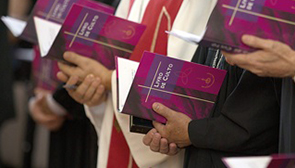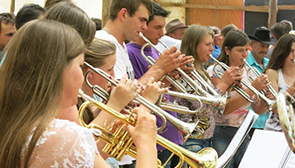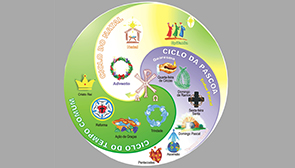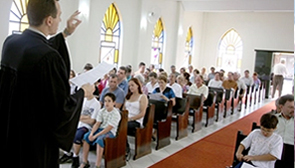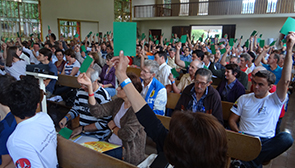Called to Common Mission: Official Text
A Lutheran Proposal for a Revision of the Concordat of Agreement
As Amended by the 1999 Churchwide Assembly of the Evangelical Lutheran Church in America
(August 19, 1999)
1. The Lutheran-Episcopal Agreement of 1982 identified as its goal the establishment of full communion (communio in sacris/altar and pulpit fellowship) between The Episcopal Church and the churches that united to form the Evangelical Lutheran Church in America. As the meaning of full communion for purposes of this Concordat of Agreement, both churches endorse in principle the definitions agreed to by the (international) Anglican-Lutheran Joint Working Group at Cold Ash, Berkshire, England, in 1983, which they deem to be in full accord with their own definitions given in the Evangelical Lutheran Church in America's policy statement Ecumenism: The Vision of the Evangelical Lutheran Church in America (1991), and in the Declaration on Unity of The Episcopal Church (1979). This agreement describes the relationship between our two church bodies. It does not define the church, which is a gift of God's grace.
2. We therefore understand full communion to be a relation between distinct churches in which each recognizes the other as a catholic and apostolic church holding the essentials of the Christian faith. Within this new relation, churches become interdependent while remaining autonomous. Full communion includes the establishment locally and nationally of recognized organs of regular consultation and communication, including episcopal collegiality, to express and strengthen the fellowship and enable common witness, life, and service. Diversity is preserved, but this diversity is not static. Neither church seeks to remake the other in its own image, but each is open to the gifts of the other as it seeks to be faithful to Christ and his mission. They are together committed to a visible unity in the church's mission to proclaim the Word and administer the Sacraments.
3. The Episcopal Church agrees that in its General Convention, and the Evangelical Lutheran Church in America agrees that in its Churchwide Assembly, there shall be one vote to accept or reject, as a matter of verbal content as well as in principle, the full set of agreements to follow. If they are adopted by both churches, each church agrees to make those legislative, canonical, constitutional, and liturgical changes that are needed and appropriate for the full communion between the churches. In adopting this document, the Evangelical Lutheran Church in America and The Episcopal Church specifically acknowledge and declare that it has been correctly interpreted by the resolution of the Conference of Bishops of the Evangelical Lutheran Church in America, adopted at Tucson, Arizona, March 8, 1999.1
A. Agreements
Agreement in the Doctrine of the Faith
4. The Evangelical Lutheran Church in America and The Episcopal Church recognize in each other the essentials of the one catholic and apostolic faith as it is witnessed in the unaltered Augsburg Confession, the Small Catechism, and The Book of Common Prayer of 1979 (including Ordination Rites and An Outline of the Faith), and also as it is summarized in part in Implications of the Gospel and Toward Full Communion and Concordat of Agreement, (containing the reports of Lutheran-Episcopal Dialogue III), the papers and official conversations of Lutheran-Episcopal Dialogue III, and the statements formulated by Lutheran-Episcopal Dialogues I and II. Each church also promises to encourage its people to study each other's basic documents.
5. We endorse the international Anglican-Lutheran doctrinal consensus which was summarized in The Niagara Report (1989) as follows: We accept the authority of the canonical Scriptures of the Old and New Testaments. We read the Scriptures liturgically in the course of the church's year.
We accept the Niceno-Constantinopolitan and Apostles' Creeds and confess the basic Trinitarian and Christological Dogmas to which these creeds testify. That is, we believe that Jesus of Nazareth is true God and true Man, and that God is authentically identified as Father, Son, and Holy Spirit.
Anglicans and Lutherans use very similar orders of service for the Eucharist, for the Prayer Offices, for the administration of Baptism, for the rites of Marriage, Burial, and Confession and Absolution. We acknowledge in the liturgy both a celebration of salvation through Christ and a significant factor in forming the consensus fidelium [the consensus of the faithful]. We have many hymns, canticles, and collects in common.
We believe that baptism with water in the name of the Triune God unites the one baptized with the death and resurrection of Jesus Christ, initiates into the one, holy, catholic and apostolic church, and confers the gracious gift of new life.
We believe that the Body and Blood of Christ are truly present, distributed, and received under the forms of bread and wine in the Lord's Supper. We also believe that the grace of divine forgiveness offered in the sacrament is received with the thankful offering of ourselves for God's service.
We believe and Proclaim the gospel, that in Jesus Christ God loves and redeems the world. We share a common understanding of God's justifying grace, i.e. that we are accounted righteous and are made righteous before God only by grace through faith because of the merits of our Lord and Saviour Jesus Christ, and not on account of our works or merit. Both our traditions affirm that justification leads and must lead to 'good works'; authentic faith issues in love.
Anglicans and Lutherans believe that the church is not the creation of individual believers, but that it is constituted and sustained by the Triune God through God's saving action in Word and Sacraments. We believe that the church is sent into the world as sign, instrument, and foretaste of the kingdom of God. But we also recognize that the church stands in constant need of reform and renewal.
We believe that all members of the church are called to participate in its apostolic mission. They are therefore given various ministries by the Holy Spirit. Within the community of the church the ordained ministry exists to serve the ministry of the whole people of God. We hold the ordained ministry of Word and Sacrament to be a gift of God to his church and therefore an office of divine institution.
We believe that a ministry of pastoral oversight (episkope), exercised in personal, collegial, and communal ways, is necessary to witness to and safeguard the unity and apostolicity of the church.
We share a common hope in the final consummation of the kingdom of God and believe that we are compelled to work for the establishment of justice and peace. The obligations of the kingdom are to govern our life in the church and our concern for the world. The Christian faith is that God has made peace through Jesus 'by the blood of his cross' (Colossians 1:20) so establishing the one valid center for the unity of the whole human family.
Agreement in Ministry
6. The ministry of the whole people of God forms the context for what is said here about all forms of ministry. We together affirm that all members of Christ's church are commissioned for ministry through baptism. All are called to represent Christ and his church; to bear witness to him wherever they may be; to carry on Christ's work of reconciliation in the world; and to participate in the life, worship, and governance of the church. We give thanks for a renewed discovery of the centrality of the ministry of all the baptized in both our churches. Our witness to the gospel and pursuit of peace, justice, and reconciliation in the world have been immeasurably strengthened. Because both our churches affirm this ministry which has already been treated in our previous dialogues, it is not here extensively addressed. Both churches need more adequately to realize the ministry of the baptized through discernment of gifts, education, equipping the saints for ministry, and seeking and serving Christ in all persons.
7. We acknowledge that one another's ordained ministries are and have been given by God to be instruments of God's grace in the service of God's people, and possess not only the inward call of the Spirit, but also Christ's commission through his body, the church. We acknowledge that personal, collegial, and communal oversight is embodied and exercised in both our churches in a diversity of forms, in fidelity to the teaching and mission of the apostles. We agree that ordained ministers are called and set apart for the one ministry of Word and Sacrament, and that they do not cease thereby to share in the priesthood of all believers. They fulfill their particular ministries within the community of the faithful and not apart from it. The concept of the priesthood of all believers affirms the need for ordained ministry, while at the same time setting ministry in proper relationship to the laity. The Anglican tradition uses the terms presbyter and priest and the Lutheran tradition in America characteristically uses the term pastor for the same ordained ministry.
8. In order to give witness to the faith we share (see paragraphs 4 and 5 above), we agree that the one ordained ministry will be shared between the two churches in a common pattern for the sake of common mission. In the past, each church has sought and found ways to exercise the ordained ministry in faithfulness to the apostolic message and mission. Each has developed structures of oversight that serve the continuity of this ministry under God's Word. Within the future common pattern, the ministry of pastors/priests will be shared from the outset (see paragraph 16 below). Some functions of ordained deacons in The Episcopal Church and consecrated diaconal ministers and deaconesses in the Evangelical Lutheran Church in America can be shared insofar as they are called to be agents of the church in meeting needs, hopes, and concerns within church and society. The churches will over time come to share in the ministry of bishops in an evangelical, historic succession (see paragraph 19 below). This succession also is manifest in the churches' use of the apostolic scriptures, the confession of the ancient creeds, and the celebration of the sacraments instituted by our Lord. As our churches live in full communion, our ordained ministries will still be regulated by the constitutional framework of each church.
9. Important expectations of each church for a shared ordained ministry will be realized at the beginning of our new relation: an immediate recognition by The Episcopal Church of presently existing ordained ministers within the Evangelical Lutheran Church in America and a commitment by the Evangelical Lutheran Church in America to receive and adapt an episcopate that will be shared. Both churches acknowledge that the diaconate, including its place within the threefold ministerial office and its relationship with all other ministries, is in need of continuing exploration, renewal, and reform, which they pledge themselves to undertake in consultation with one another. The ordination of deacons, deaconesses, or diaconal ministers by the Evangelical Lutheran Church in America is not required by this Concordat.
10. The New Testament describes a laying-on-of-hands to set persons apart for a variety of ministries. In the history of the church, many and various terms have been used to describe the rite by which a person becomes a bishop. In the English language these terms include: confecting, consecrating, constituting, installing, making, ordaining, ordering. Both our traditions have used the term consecration of bishops for this same rite at some times. Today the Evangelical Lutheran Church in America uses the term installation while The Episcopal Church uses the word ordination for the rite by which a person becomes a bishop. What is involved in each case is the setting apart within the one ministry of Word and Sacrament of a person elected and called for the exercise of oversight (episkope) wider than the local congregation in the service of the gospel.
11. Historic succession refers to a tradition which goes back to the ancient church, in which bishops already in the succession install newly elected bishops with prayer and the laying-on-of-hands. At present The Episcopal Church has bishops in this historic succession, as do all the churches of the Anglican Communion, and the Evangelical Lutheran Church in America at present does not, although some member churches of the Lutheran World Federation do. The Chicago-Lambeth Quadrilateral of 1886/1888, the ecumenical policy of The Episcopal Church, refers to this tradition as the historic episcopate. In the Lutheran Confessions, Article 14 of the Apology refers to this episcopal pattern by the phrase, the ecclesiastical and canonical polity which it is our deep desire to maintain.
Commitment and Definition
12. As a result of their agreement in faith and in testimony of their full communion with one another, both churches now make the following commitment to share an episcopal succession that is both evangelical and historic. They promise to include regularly one or more bishops of the other church to participate in the laying-on-of-hands at the ordinations/installations of their own bishops as a sign, though not a guarantee, of the unity and apostolic continuity of the whole church. With the laying-on-of-hands by other bishops, such ordinations/installations will involve prayer for the gift of the Holy Spirit. Both churches value and maintain a ministry of episkope as one of the ways, in the context of ordained ministries and of the whole people of God, in which the apostolic succession of the church is visibly expressed and personally symbolized in fidelity to the gospel through the ages. By such a liturgical statement the churches recognize that the bishop serves the diocese or synod through ties of collegiality and consultation that strengthen its links with the universal church. It is also a liturgical expression of the full communion initiated by this Concordat, calling for mutual planning and common mission in each place. We agree that when persons duly called and elected are ordained/installed in this way, they are understood to join bishops already in this succession and thus to enter the historic episcopate.
13. While our two churches will come to share in the historic institution of the episcopate in the church (as defined in paragraph 12 above), each remains free to explore its particular interpretations of the ministry of bishops in evangelical and historic succession. Whenever possible, this should be done in consultation with one another. The Episcopal Church is free to maintain that sharing in the historic catholic episcopate, while not necessary for salvation or for recognition of another church as a church, is nonetheless necessary when Anglicans enter the relationship of full communion in order to link the local churches for mutual responsibility in the communion of the larger church. The Evangelical Lutheran Church in America is free to maintain that this same episcopate, although pastorally desirable when exercised in personal, collegial, and communal ways, is nonetheless not necessary for the relationship of full communion. Such freedom is evidenced by its communion with such non-episcopal churches as the Reformed churches of A Formula of Agreement and most churches within the Lutheran World Federation.
14. The two churches will acknowledge immediately the full authenticity of each other's ordained ministries (bishops, priests, and deacons in The Episcopal Church and pastors in the Evangelical Lutheran Church in America). The creation of a common and fully interchangeable ministry of bishops in full communion will occur with the incorporation of all active bishops in the historic episcopal succession and the continuing process of collegial consultation in matters of Christian faith and life. For both churches, the relationship of full communion begins when both churches adopt this Concordat. For the Evangelical Lutheran Church in America, the characteristics of the goal of full communion - defined in its 1991 policy statement, Ecumenism: The Vision of the Evangelical Lutheran Church in America-will be realized at this time. For The Episcopal Church, full communion, although begun at the same time, will not be fully realized until both churches determine that in the context of a common life and mission there is a shared ministry of bishops in the historic episcopate. For both churches, life in full communion entails more than legislative decisions and shared ministries. The people of both churches have to receive and share this relationship as they grow together in full communion.
B. Actions of The Episcopal Church
15. The Episcopal Church by this Concordat recognizes the ministers ordained in the Evangelical Lutheran Church in America or its predecessor bodies as fully authentic. The Episcopal Church acknowledges that the pastors and bishops of the Evangelical Lutheran Church in America minister as pastors/priests within the Evangelical Lutheran Church in America and that the bishops of the Evangelical Lutheran Church in America are pastors/priests exercising a ministry of oversight (episkope) within its synods. Further, The Episcopal Church agrees that all bishops of the Evangelical Lutheran Church in America who are chosen after both churches pass this Concordat and installed within the ministry of the historic episcopate will be understood by The Episcopal Church as having been ordained into this ministry (see paragraph 18 below).
16. To enable the full communion that is coming into being by means of this Concordat, The Episcopal Church pledges to continue the process for enacting a temporary suspension, in this case only, of the seventeenth-century restriction that no persons are allowed to exercise the offices of bishop, priest, or deacon in this Church unless they are so ordained, or have already received such ordination with the laying-on-of-hands by bishops who are themselves duly qualified to confer Holy Orders (Preface to the Ordination Rites, The Book of Common Prayer, p. 510). The purpose of this action, to declare this restriction inapplicable to the Evangelical Lutheran Church in America, will be to permit the full interchangeability and reciprocity of all its pastors as priests or presbyters within The Episcopal Church, without any further ordination or re-ordination or supplemental ordination whatsoever, subject always to canonically or constitutionally approved invitation. The purpose of temporarily suspending this restriction, which has been a constant requirement in Anglican polity since the Ordinal of 1662, is precisely in order to secure the future implementation of the ordinals' same principle in the sharing of ordained ministries. It is for this reason that The Episcopal Church can feel confident in taking this unprecedented step with regard to the Evangelical Lutheran Church in America.
17. The Episcopal Church acknowledges and seeks to receive the gifts of the Lutheran tradition which has consistently emphasized the primacy of the Word. The Episcopal Church therefore endorses the Lutheran affirmation that the historic catholic episcopate under the Word of God must always serve the gospel, and that the ultimate authority under which bishops preach and teach is the gospel itself (see Augsburg Confession 28. 21-23). In testimony and implementation thereof, The Episcopal Church agrees to establish and welcome, either by itself or jointly with the Evangelical Lutheran Church in America, structures for collegial and periodic review of the ministry exercised by bishops with a view to evaluation, adaptation, improvement, and continual reform in the service of the gospel.
C. Actions of the Evangelical Lutheran Church in America
18. The Evangelical Lutheran Church in America agrees that all its bishops chosen after both churches pass this Concordat will be installed for pastoral service of the gospel with this church's intention to enter the ministry of the historic episcopate. They will be understood by The Episcopal Church as having been ordained into this ministry, even though tenure in office of the Presiding Bishop and synodical bishops may be terminated by retirement, resignation, disciplinary action, or conclusion of term. Any subsequent installation of a bishop so installed includes a prayer for the gift of the Holy Spirit without the laying-on-of-hands. The Evangelical Lutheran Church in America further agrees to revise its rite for the installation of a Bishop to reflect this understanding. A distinction between episcopal and pastoral ministries within the one office of Word and Sacrament is neither commanded nor forbidden by divine law (see Apology of the Augsburg Confession 14.1 and the Treatise on the Power and Primacy of the Pope 63). By thus freely accepting the historic episcopate, the Evangelical Lutheran Church in America does not thereby affirm that it is necessary for the unity of the church (Augsburg Confession 7.3).
19. In order to receive the historic episcopate, the Evangelical Lutheran Church in America pledges that, following the adoption of this Concordat and in keeping with the collegiality and continuity of ordained ministry attested as early as Canon 4 of the First Ecumenical Council (Nicaea I, a.d. 325), at least three bishops already sharing in the sign of the episcopal succession will be invited to participate in the installation of its next Presiding Bishop through prayer for the gift of the Holy Spirit and with the laying-on-of-hands. These participating bishops will be invited from churches of the Lutheran communion which share in the historic episcopate. In addition, a bishop or bishops will be invited from The Episcopal Church to participate in the same way as a symbol of the full communion now shared. Synodical bishops elected and awaiting installation may be similarly installed at the same service, if they wish. Further, all other installations of bishops in the Evangelical Lutheran Church in America will be through prayer for the gift of the Holy Spirit and with the laying-on-of-hands by other bishops, at least three of whom are to be in the historic succession (see paragraph 12 above). Its liturgical rites will reflect these provisions.
20. In accord with the historic practice whereby the bishop is representative of the wider church, the Evangelical Lutheran Church in America agrees to make constitutional and liturgical provision that a bishops shall regularly preside and participate in the laying-on-of-hands at the ordination of all clergy. Pastors shall continue to participate with the bishop in the laying-on-of-hands at all ordinations of pastors. Such offices are to be exercised as servant ministry, and not for domination or arbitrary control. All the people of God have a true equality, dignity, and authority for building up the body of Christ.
21. The Evangelical Lutheran Church in America by this Concordat recognizes the bishops, priests, and deacons ordained in The Episcopal Church as fully authentic ministers in their respective orders within The Episcopal Church and the bishops of The Episcopal Church as chief pastors in the historic succession exercising a ministry of oversight (episkope) within its dioceses.
D. Actions of Both Churches
Interchangeability of Clergy: Occasional Ministry, Extended Service, Transfer
22. In this Concordat, the two churches declare that each believes the other to hold all the essentials of the Christian faith, although this does not require from either church acceptance of all doctrinal formulations of the other. Ordained ministers serving occasionally or for an extended period in the ministry of the other church will be expected to undergo the appropriate acceptance procedures of that church respecting always the internal discipline of each church. For the Evangelical Lutheran Church in America, such ministers will be expected to preach, teach, and administer the sacraments in a manner that is consistent with its Confession of Faith as written in chapter two of the Constitution, Bylaws, and Continuing Resolutions of the Evangelical Lutheran Church in America. For The Episcopal Church, such ministers will be expected to teach and act in a manner that is consistent with the doctrine, discipline, and worship of The Episcopal Church. Ordained ministers from either church seeking long-term ministry with primary responsibility in the other will be expected to apply for clergy transfer and to agree to the installation vow or declaration of conformity in the church to which she or he is applying to minister permanently.
Joint Commission
23. To assist in joint planning for mission, both churches authorize the establishment of a joint commission, fully accountable to the decision-making bodies of the two churches. Its purpose will be consultative, to facilitate mutual support and advice as well as common decision making through appropriate channels in fundamental matters that the churches may face together in the future. The joint commission will work with the appropriate boards, committees, commissions, and staff of the two churches concerning such ecumenical, doctrinal, pastoral, and liturgical matters as may arise, always subject to approval by the appropriate decision-making bodies of the two churches.
Wider Contex
24. In thus moving to establish, in geographically overlapping episcopates in collegial consultation, one ordained ministry open to women as well as to men, to married persons as well as to single persons, both churches agree that the historic catholic episcopate can be locally adapted and reformed in the service of the gospel. In this spirit they offer this Concordat and growth toward full communion for serious consideration among the churches of the Reformation as well as among the Orthodox and Roman Catholic churches. They pledge widespread consultation during the process at all stages. Each church promises to issue no official commentary on this text that has not been accepted by the joint commission as a legitimate interpretation thereof.
Existing Relationships
25. Each church agrees that the other church will continue to live in communion with all the churches with whom the latter is now in communion. The Evangelical Lutheran Church in America continues to be in full communion (pulpit and altar fellowship) with all member churches of the Lutheran World Federation and with three of the Reformed family of churches (Presbyterian Church [U.S.A.], Reformed Church in America, and United Church of Christ). This Concordat does not imply or inaugurate any automatic communion between The Episcopal Church and those churches with whom the Evangelical Lutheran Church in America is in full communion. The Episcopal Church continues to be in full communion with all the Provinces of the Anglican Communion, with the Old Catholic Churches of Europe, with the united churches of the Indian subcontinent, with the Mar Thoma Church, and with the Philippine Independent Church. This Concordat does not imply or inaugurate any automatic communion between the Evangelical Lutheran Church in America and those churches with whom The Episcopal Church is in full communion.
Other Dialogues
26. Both churches agree that each will continue to engage in dialogue with other churches and traditions. Both churches agree to take each other and this Concordat into account at every stage in their dialogues with other churches and traditions. Where appropriate, both churches will seek to engage in joint dialogues. On the basis of this Concordat, both churches pledge that they will not enter into formal agreements with other churches and traditions without prior consultation with each other. At the same time both churches pledge that they will not impede the development of relationships and agreements with other churches and traditions with whom they have been in dialogue.
E. Conclusion
27. Recognizing each other as churches in which the gospel is truly preached and the holy sacraments duly administered, we receive with thanksgiving the gift of unity which is already given in Christ.
He is the image of the invisible God, the firstborn of all creation; for in him all things in heaven and on earth were created, things visible and invisible, whether thrones or dominions or rulers or powers -- all things have been created through him and for him. He himself is before all things, and in him all things hold together. He is the head of the body, the church; he is the beginning, the firstborn from the dead, so that he might come to have first place in everything. For in him all the fullness of God was pleased to dwell, and through him God was pleased to reconcile to himself all things, whether on earth or in heaven, by making peace through the blood of his cross (Colossians 1:15-20).
28. Repeatedly Christians have echoed the scriptural confession that the unity of the church is both Christ's own work and his call to us. It is therefore our task as well as his gift. We must make every effort to maintain the unity of the Spirit in the bond of peace (Ephesians 4:3). We pray that we may rely upon, and willingly receive from one another, the gifts Christ gives through his Spirit for building up the body of Christ in love (Ephesians 4:16).
29. We do not know to what new, recovered, or continuing tasks of mission this Concordat will lead our churches, but we give thanks to God for leading us to this point. We entrust ourselves to that leading in the future, confident that our full communion will be a witness to the gift and goal already present in Christ, so that God may be all in all (1 Corinthians 15:28). Entering full communion and thus removing limitations through mutual recognition of faith, sacraments, and ministries will bring new opportunities and levels of shared evangelism, witness, and service. It is the gift of Christ that we are sent as he has been sent (John 17:17-26), that our unity will be received and perceived as we participate together in the mission of the Son in obedience to the Father through the power and presence of the Holy Spirit.
Now to him who by the power at work within us is able to accomplish abundantly far more than all we can ask or imagine, to him be glory in the church and in Christ Jesus to all generations, forever and ever. Amen
(Ephesians 3:20-21).
1 RESOLVED, that the Conference of Bishops affirm the following understandings of Called to Common Mission:
A. The Conference of Bishops understands that Called to Common Mission contains:
1. no requirement that the Evangelical Lutheran Church in America must eventually adopt the three-fold order of ministry. Rather, Called to Common Mission recognizes that the present understanding of one ordained ministry in the Evangelical Lutheran Church in America, including both pastors and bishops, may continue in effect;
2. no requirement that ELCA bishops be elected to serve as synodical bishops for life. Rather, they will continue to be elected and installed for six-year terms, with eligibility for re-election, subject to term limits, where applicable;
3. no defined role for the presiding bishop or synodical bishops after their tenure in office is completed;
4. no requirement that the Evangelical Lutheran Church in America establish the office of deacon, nor that they be ordained;
5. no requirement that priests of The Episcopal Church will serve congregations of the Evangelical Lutheran Church in America without the congregation's consent;
6. no requirement that the Ordinal (rules) of The Episcopal Church will apply to the Evangelical Lutheran Church in America;
7. no commitment to additional constitutional amendments or liturgical revisions other than those presented to the 1999 ELCA Churchwide Assembly (ELCA constitutional provisions 8.72.10-16.; 9.21.02.; 9.90.-9.91.02.; 10.31.a.9.; 10.81.01., and parallel provisions in synodical and congregational constitutions); and further
B. The Conference of Bishops has the expectation that:
1. ordinations of pastors will continue to be held at synodical worship services and in congregations, as is the present pattern;
2. the Evangelical Lutheran Church in America will continue to receive onto the roster of ordained ministers, without re-ordination, pastors from other traditions, some of whom will not have been ordained by a bishop in the historic episcopate;
3. following the adoption of Called to Common Mission, if someone who has been received onto the roster of ordained ministers of the Evangelical Lutheran Church in America who was not ordained into the pastoral office in the historic episcopate is elected bishop and installed, he or she will be understood to be a bishop in the historic episcopate;
4. lay persons may continue to be licensed by the synodical bishop in unusual circumstances to administer the Sacraments of Baptism and Holy Communion as is the present practice of the Evangelical Lutheran Church in America;
5. Definitions and Guidelines for Discipline of Ordained Ministers will apply to priests of The Episcopal Church and ordained ministers of the Reformed churches serving ELCA congregations [under continuing resolution 8.72.15.b., A...to live in a manner consistent with the ministerial policy of this church.];
6. the Evangelical Lutheran Church in America is not in any way changing its confessional stance that, For the true unity of the Church it is enough to agree concerning the teaching of the Gospel and the administration of the sacraments (Augsburg Confession, Article VII);
7. The Episcopal Church accepts fully, and without reservation, present Lutheran pastors and bishops who are not in the historic episcopal succession;
8. priests of The Episcopal Church and ordained ministers of the Reformed churches will not be asked to subscribe personally to the Confession of Faith of the Lutheran Church as their personal faith. They will be expected to recognize the agreement in faith of the churches and to preach and teach in a manner consistent with the Lutheran Confessions;
9. the Evangelical Lutheran Church in America receives the historic episcopal succession as a sign of and service to the continuity and unity of the Church and in no way as a guarantee of the faithful transmission of the faith;
10. future decisions of the Evangelical Lutheran Church in America on matters of common concern will be made in consultation with churches with whom a relationship of full communion has been declared, but these decisions will not require their concurrence or approval;
11. future Churchwide Assemblies of the Evangelical Lutheran Church in America will be free to make whatever decisions they deem necessary after mutual consultation on matters related to full communion;
12. the joint commission [to which reference is made in Called to Common Mission] will have no authority over the appropriate decision-making bodies of the Evangelical Lutheran Church in America or The Episcopal Church; and
13. pastors of the Evangelical Lutheran Church in America will continue to preside at confirmations.



